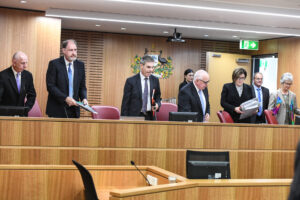The Fair Work Commission has announced an important increase in the national minimum wage, which will rise by $1.05 per hour (or 5.2%) effective 1 July 2022. This represents a significant shift in the debate over wages in Australia, whichi have been languishing for years — and are now falling in real terms.
Even with this new increase, however, real wages for the lowest-paid Australian workers are likely to go backwards this year, with inflation pegged to accelerate to as much as 7%. Nevertheless, Australia’s business lobby are repeating tired old complaints about minimum wages being too high, stoking further inflation, and undermining profits.
In his latest commentary, published in The Guardian, Policy Director Greg Jericho reviews and debunks these predictable complaints. The evidence is clear that wages are not causing inflation. Profit margins have grown along with prices. Workers deserve to have their real incomes protected, as the true sources of the problem (arising mostly from after-effects of the pandemic and the global energy price shock) are addressed.
Please see Greg’s full column, “Workers and their wages are the collateral damage of the war on inflation.”
You might also like
The continuing irrelevance of minimum wages to future inflation
Minimum and award wages should grow by 5 to 9 per cent this year
Want to lift workers’ productivity? Let’s start with their bosses
Business representatives sit down today with government and others to talk about productivity. Who, according to those business representatives, will need to change the way they do things?
Feeling hopeless? You’re not alone. The untold story behind Australia’s plummeting standard of living
A new report on Australia’s standard of living has found that low real wages, underfunded public services and skyrocketing prices have left many families experiencing hardship and hopelessness.


